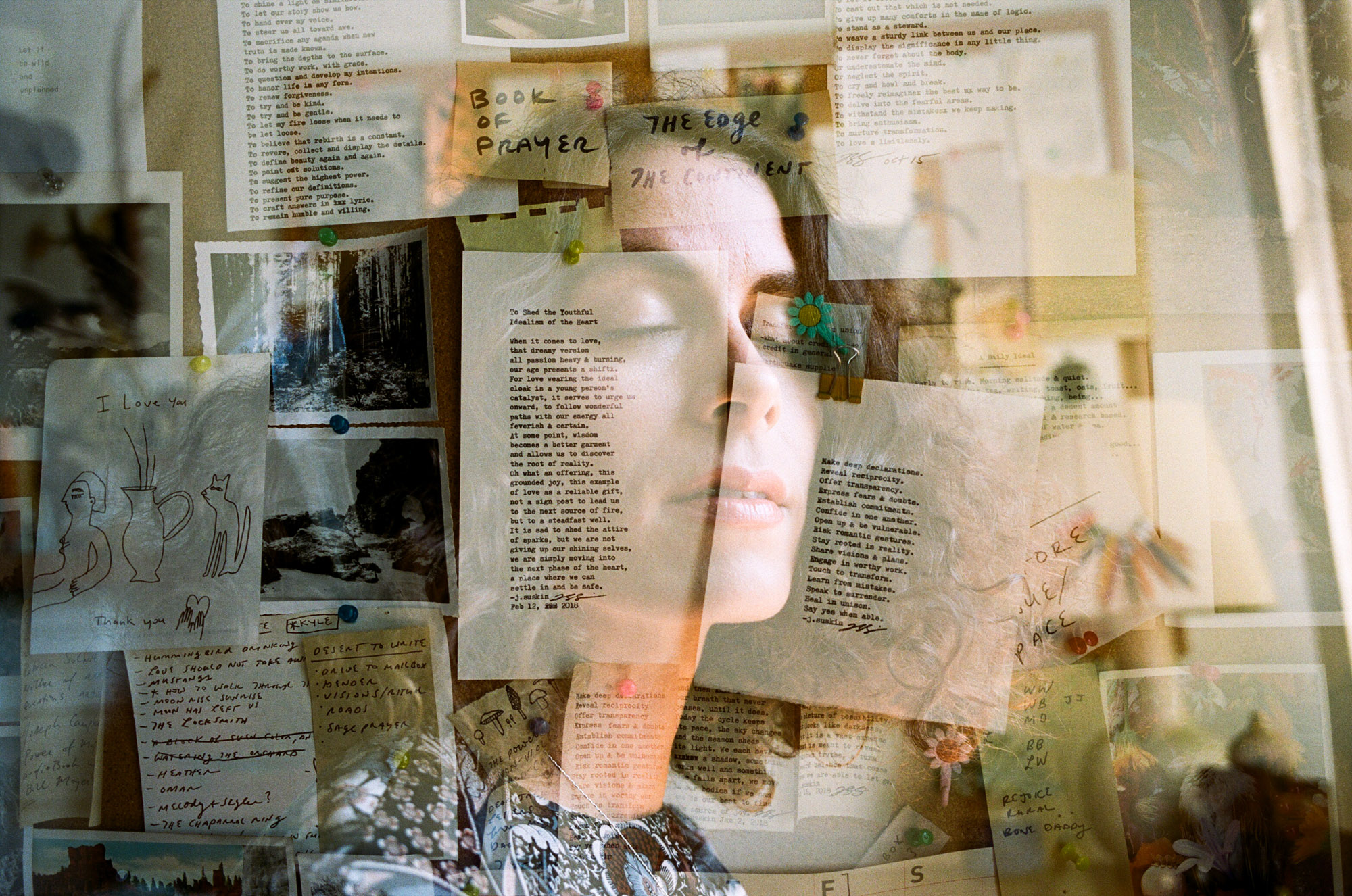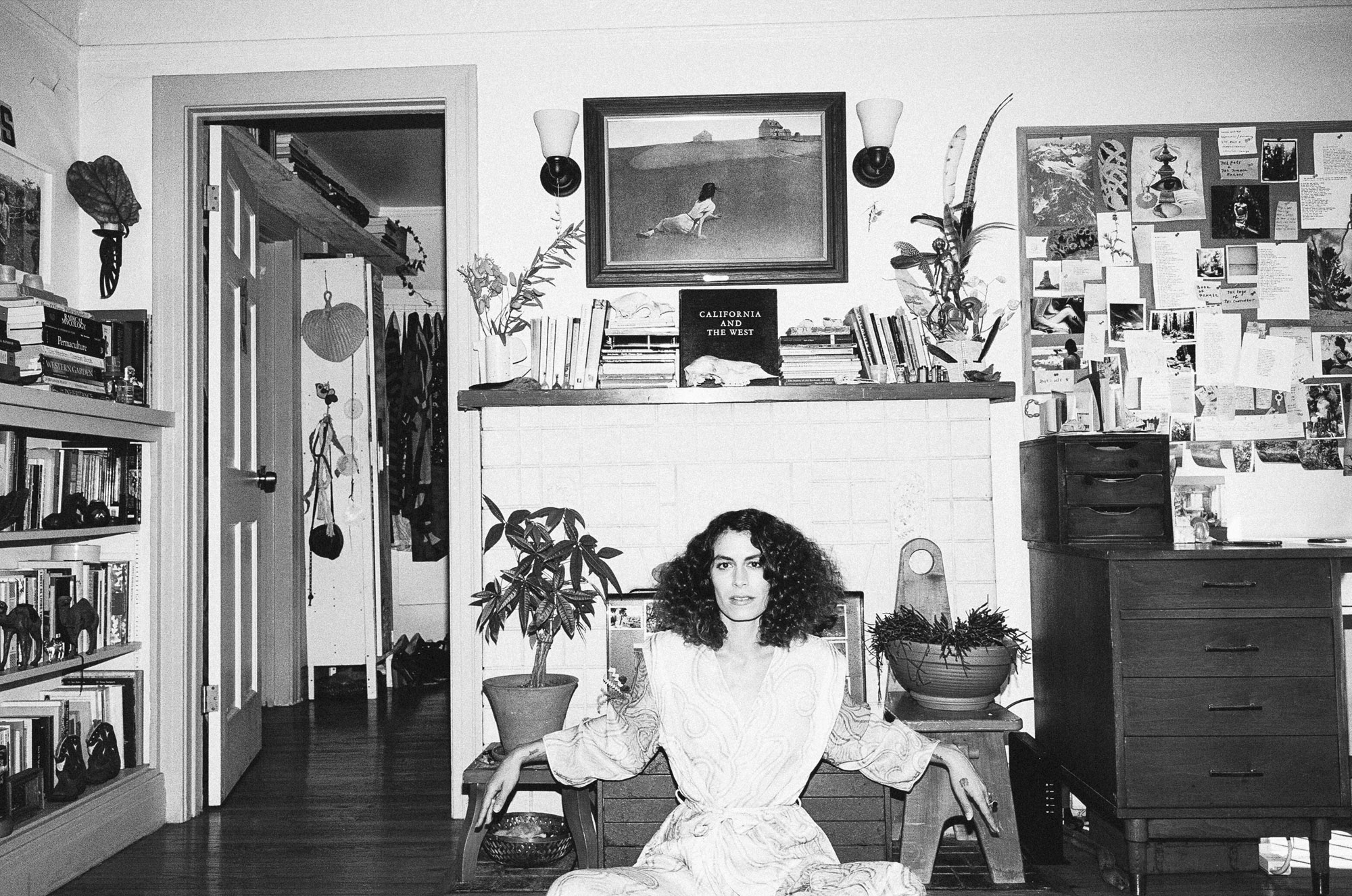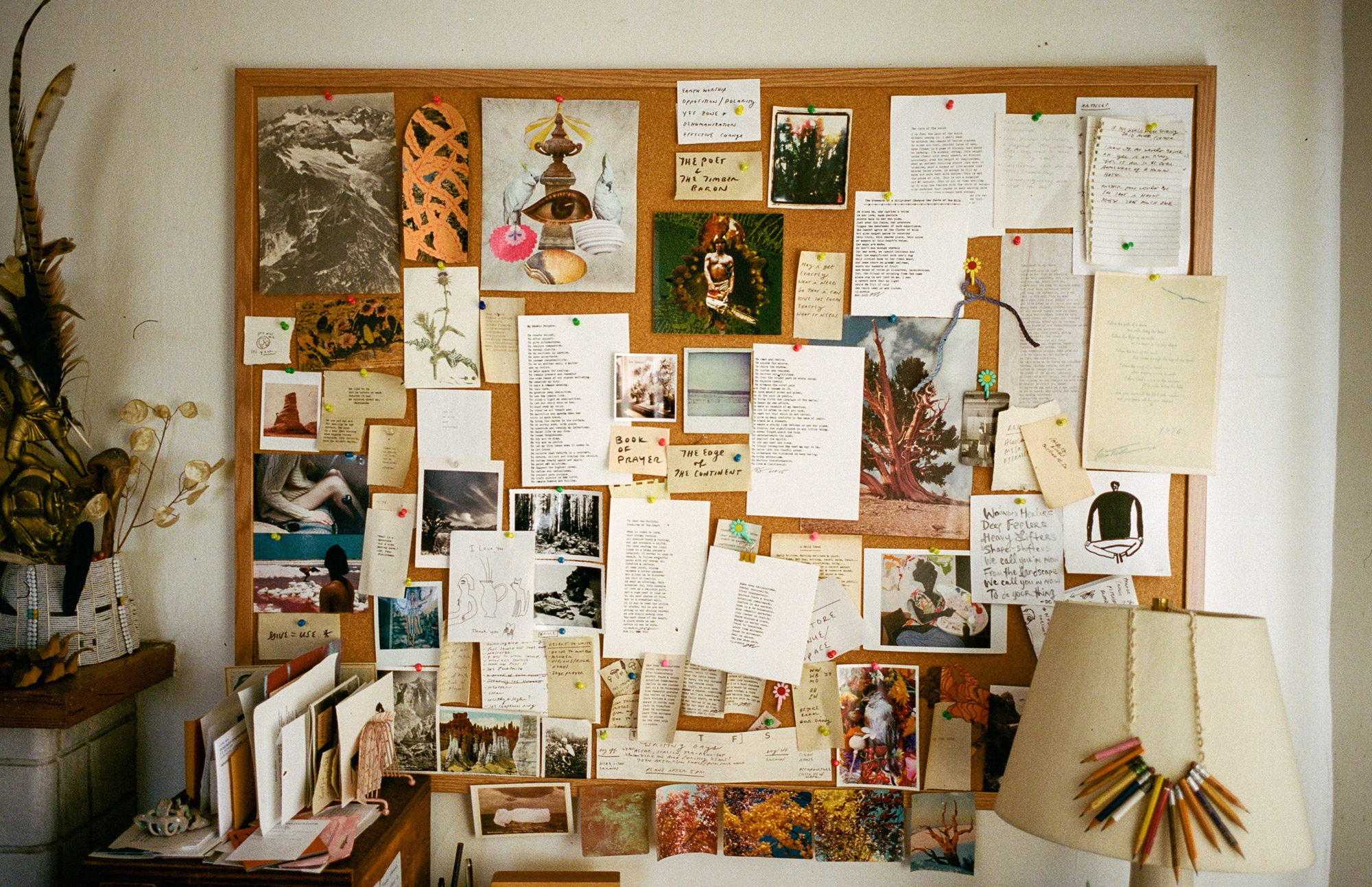
Jacqueline Suskin
Jacqueline Suskin is a poet and performance artist living in Los Angeles. Most famously known for her multi-disciplinary project “Poem Store,” Jacqueline has been creating original poems across the world for the everywoman since 2009. When approaching her Poem Store, possibly set up on any given street corner in the United States, she asks that you give her a topic and a price– and she will then provide you with an original typewritten poem to keep. Jacqueline is an artist to be admired, with a remarkable insight into the human condition which is used to help people who need her the most. Please read on.
Photography by Shelby Duncan
Girls at Library: What was the name of the first book you fell in love with, that turned you into a lifelong reader?
Jacqueline Suskin: Well, Harriet The Spy by Louise Fitzhugh was my first obsession as a really young child, but I would say my first true love was J.D. Salinger. Somehow I got my hands on his books in middle school and was exposed to a deeply emotional world that made so much sense to me. Why it made sense to me is somewhat a mystery. I lived in a trailer park in the Florida Keys and knew nothing of New York aristocracy. My life was nothing like the life of the characters in his work, and yet it was their expression, their inner worlds that pulled me in. I cried for a week after I finished the small collection of Salinger’s work. I wanted more and there wasn’t more. I remember kissing the pages of his books, staining them with tears like a romantic maniac. I’ve actually kissed quite a few books. That feels like a natural response when I read a line I love or finish a chapter that makes me want to explode with a feeling of affirmation.
GAL: What is the power of story? Describe some ways in which fictional narratives have impacted you and your life?
JS: I think it’s that feeling of affirmation! Salinger inspired me so intensely and shifted my entire perspective. I saw how impactful a book could be. It wasn’t just the story for me though— it was more the author himself. I was always aware that a real human being wrote those books, and because I too am a human being, I knew I could do the same thing. I wanted to create work that would inspire others, that would help them to feel seen and understood, because that’s what I felt when I read Salinger: I no longer felt alone. And oh to be connected to someone so great, someone so influential and unique! That connection alone created a deep respect for the ability of a shared to story to offer up universal implications, a bond that could reach far beyond my small sphere.
GAL: When did you know you were a writer?
JS: When I was really little. I spent my childhood filling up notebooks with strange, cryptic language. I have all these notebooks from when I was learning how to make letters. I filled up notebooks with stories that you can kind of piece together and figure out what I was saying. I was always drawn to writing even when I was that young.
GAL: Do you remember what age exactly, or was it so young you can’t even remember?
JS: I had this poem that I would actually call my first poem, and it was about a fox, and I’m pretty sure I wrote that when I was six-years-old or something? Like pretty young. Pieced it together probably sitting there with a parent or something, but I still have that little piece of paper.
GAL: What do you think of it today? Does it still resonate?
JS: Yeah, totally! Basically I think the sense of having always been a poet was kind of rooted in the fact that I was always in awe of everything, especially the natural world, but just anything. I filled diaries with experiential things that all had to do with me being in complete amazement of whatever was happening in my life. So even if it was really hard, I was kind of like, wow, this thing that’s happening that’s so fascinating, it’s worth for me to sit in and write pages and pages about it.
GAL: That’s lovely. A true artist.
JS: So yeah, the way I think about that is looking at other kids now, and thinking like, when you see a kid who’s drawn to express themselves in that way, it’s just such a natural part of — you could be born with that kind of lens, or something.
bottoms by Wonder Wears The Gold
GAL: Definitely. I wonder how that would affected, changed, or altered if you had grown up with technology the way kids have technology at their fingertips at all hours of the day.
JS: Yeah! Well I teach a lot, and in the classroom I always ask kids, “Who keeps a journal?” And maybe one person will raise their hand. I urge them to keep one. Having a journal and having a private space where you lay your thoughts out is important. I think these kids are so used to having a public space where they write or express themselves and everyone can see it all the time, but having that private space within a journal saved my life as a kid. Through my parents’ divorce, through moving, through changing schools, through young little heartbreaks, having a journal was my saving grace.
GAL: Do you keep a journal now?
JS: Oh yeah, definitely. I will always have a journal. I feel like it’s such a remedy, such a pep talk. I go back and read through my journal sometimes to find notes I’m giving myself for working on a book or something like that, like I’m giving myself a pep talk every day!
GAL: That’s so nice! Do you have a favorite brand of journal?
JS: Over the past six years I’ve taken to using very large hardcover journals. The ones I love the most are these journals for people who do graffiti, they can practice in them because nothing bleeds through to the next page. I love the texture and the size of these notebooks, so I’ve taken to always purchasing them.
GAL: What kind of typewriter do you use?
JS: I use a Hermes Rocket. I have fourteen typewriters, but the one I used for Poem Store and the one that I use the most is the Hermes Rocket. It’s the nicest one that I own and it’s the one that I’ve always used, so I’ve really memorized the way it feels. And I’ve worn away at the spacebar.
GAL: Oh it’s like an old shoe! Worn in and extremely comfortable. Reliable!
JS: Yeah, it fits me perfectly.
GAL: Speaking as someone completely unfamiliar with the upkeep of such a divine instrument– where exactly do you buy your ribbons? How often do you have to buy new ribbons?
JS: You actually don’t need to service a typewriter very often, because they were made in a time when things were made to last. Even the ribbons last me for months and months and months, but I get my ribbons re-spooled and re-inked in Highland Park, in this place called Star Office Machine. It’s this typewriter repair place that’s family-owned and the man who runs it, his father ran it before him, and I love that place so much. So I go in there, but you can order typewriter ribbons online.
GAL: That’s good to know. Is it difficult to carry the typewriter around, or are you used to it?
JS: So used to it! [laughs] You know, I travel a lot for work. So, I’m flying with it, and at security they always want to look at it and half the time I think they want to look at it because they’ve never seen a typewriter. All the security guards will gather around in awe at this strange old scene.
GAL: I love imagining that scene! You’re preserving design history.
JS: Yeah, I really feel that way. My connection to the typewriter has grown so much in that direction, because they’re just so beautiful and speak to this time in production history when things were really crafted to last and be beautiful, and I just love that so much.
GAL: Me too. Speaking of history, do you have a library card?
JS: You know, in LA I don’t have a library card, and I think it’s the first place I’ve lived where I don’t have one. I think I don’t have a library card because I have so many books at my house, an unbelievable amount of books. I should probably read these before I go out into the world and start borrowing library books and accruing fees.
“I knew that I’d found a kindred spirit.
I actually believe that I carry some of Steinbeck deep within me.”
GAL: Do you have any favorite bookstores in LA?
JS: Oh yeah. I think my favorite bookstore is Alias Books East, in Atwater. I did a residency there and I just love that collection of books so much. I also love Stories in Echo Park. Skylight Books has a classic and legit feel and Stories is more of a punk rock shop preserved in time. I love that place. And Alias is just — oh my gosh, their collection, I could just stand in that bookstore every day and be in total awe. I’m amazed by their collection of books. It’s curated in a way that’s so unique.
GAL: Do you have a forever-favorite book?
JS: I still to this day say that East of Eden is my favorite book. Steinbeck created an entire history of multiple generations, tied with biblical references and spiritual philosophies, all amidst the boom of western growth. This poetic feat continues to blow my mind. It’s such a beautiful expression of California, of dark and light, of love and family. I’m so grateful for that book. I read it twice, many years ago, and then recently read Journal of a Novel, Steinbeck’s daily letters that he wrote to his editor as a warm up while creating East of Eden. Those letters exposed this personal level of an alliance between myself and Steinbeck. It’s basically a collection of journal entries, private thoughts on process and life, and when I dipped into that realm I knew that I’d found a kindred spirit. I actually believe that I carry some of Steinbeck deep within me. The way we go about writing, the difficulty of discipline and the amount of passion in our dedication…well, let’s just say I read those letters and felt like I was reading my own words.
bottoms by Wonder Wears The Gold
GAL: We have a friend who has a “Sanity Shelf,” which is dedicated to books she returns to again and again to read for pleasure, knowledge, and solace. What would be on your shelf?
JS: Becoming Wise by Krista Tippett
Bluets by Maggie Nelson
Journal of a Novel by John Steinbeck
The Collected Poems of Wendell Berry
The Collected Poems of Mary Oliver
Leaves of Grass by Walt Whitman
Letters To A Young Poet by Rainer Maria Rilke
GAL: Do you ever think about doing the Poem Store and writing poems for people in your own handwriting instead of using a typewriter?
JS: Why the typewriter, basically?
GAL: Well, yes, but why not handwriting?
JS: Well legibility is a big factor, because I’m writing so quickly, and sometimes people are waiting in line, so it’s partially a concern that they wouldn’t be able to read my wild, weird handwriting. I have strange handwriting, like a mixture of cursive and all caps, and I don’t think if I was rushed it would be easy to read. The typewriter also allows for this great sound that calls people to me, and then just the look of the typewritten page is so easily accessible and beautiful, and again just easy to read. Which I think is another nice gesture. I mean, I feel like everything I do with Poem Store is about accessibility, and just trying to make poetry and connection as accessible as possible, so even that aspect feels like a gesture in that direction.
GAL: That makes complete sense. Do you have a favorite word right now?
JS: My favorite word currently is “rural.” [laughs] I’ve been having lots of feelings about the word rural and want it tattooed on me.
GAL: It is such a funny word—rural. Say it aloud.
JS: It’s so weird to say! But I love rural life, and I love how that word kind of ties into that, and I have an ongoing list of words I love, because of how they feel to say, and that word is not one of them! It does not feel good to say, but I still love it. I’ve been thinking about it a lot lately.
GAL: What are some of your favorite words that you like to say?
JS: If anyone asks me my favorite words of all time—I like to be asked what my current favorite word is, because that does change. But these words never really change, which are: lunch, milk, Mexico, cola, and tooth.
GAL: Mmmm, love those!
JS: They just feel so good! I got that Mexico from watching E.T. when I was a kid, and little Drew Barrymore says something about their dad being in Mexico, and something about the way she says it, I remember being a kid and just saying that over and over and over again, like feeling the way it felt in my mouth to say the word.
GAL: That’s so funny. I like “lunch” too. Lunch is a good word.
JS: Oh, and “milk” too. I love that word.
GAL: You really emphasize the “k.” Mil-k.
JS: [laughs] And “cola”! I love that word. No one really says it, but I love it. “Drink a cola.”
GAL: So quaint and honest.
JS: And “tooth” is such a good word. I have such a tooth fetish, I’m kind of a tooth person, so that’s my thing. I’m really drawn to people’s teeth. Like even collecting; I have tons of animal teeth that I found in the wild.
“The first moment I wrote a poem for someone I knew
immediately it was something extremely special.”
GAL: Have you always had that fascination since you were little, or did it develop after you grew up?
JS: I think it developed as I grew up, but I’ve always collected like little dead things, even when I was younger. I had a dead bug collection with little cups and lots of feathers. Any kind of link to the natural world—lots of leaves and sticks, I was always making little zones and little altars and things like that.
GAL: Well, poetry—I’m not a poet, but I love poetry and I’ve read a fair amount of it—being a poet seems to me like you must be a discerning collector of things to be a good poet. And obviously as a writer, you’re an anthropologist of sorts.
JS: Yeah, I think that’s what’s so nice about Poem Store, too. I really love and am really good at connecting with people deeply and quickly. I’ve also always been like that– since I was really young– since before I was fully able to write anything, I was able to have deep, long conversations. Always a word person.
GAL: What inspired you to create Poem Store?
JS: Well, I was traveling a lot. I have a degree in poetry, and after I got my degree, I went on a trip around the country. Basically, I was studying permaculture. I was trying to find a place to live, and I was also writing a lot. I met this person in Oakland in my travels who was typing poems on the street for people. He was this punk guy, just really sweet, really smart, and he was like, “You should try to do this with me.” So it was kind of an experiment to see if I could write for people that quickly and that easily. And I had just gotten a typewriter the day before, so it was really weird. I was in LA, I bought a typewriter, and I drove to Oakland, and then this happened. So it kind of felt like fate. The first moment I wrote a poem for someone I knew immediately it was something extremely special. I was like, oh this is not an experiment, this is a very, very powerful mode of connection. And I didn’t think, oh this will be my career! But I did think, I should probably keep doing this.
GAL: How did you know? Did you know in your gut? Was it the reaction from people?
JS: Yeah, the first poem that I wrote—I love this story, and I think it just says everything about why it’s so impactful. But this woman came up and she was like, “I would like a poem about heartbreak. Not the regular kind of heartbreak, not like when you’re heartbroken over a lover, but like really when you look back on your whole life and you think, ‘Oh my goodness, I couldn’t live in all the places I wanted to live because you can’t live everywhere, and I couldn’t do all the things I wanted to do, because you can’t do everything, and I couldn’t love all the people I wanted to love, because you can’t love everyone, and isn’t that just heartbreaking?’” And I was like, Oh my God! Then I wrote the poem and she was weeping, and she said, “This is exactly what I needed, thank you so much.” And I knew, I just knew, I was shown in that moment what magic was held in that kind of interaction with poetry, and just being present to witness someone’s experience and translate it for them.
GAL: That’s really remarkable.
JS: It blows my mind to this day, it’s been my only job for eight years and I’m just still just, every time, my mind is still blown.
GAL: Have you ever turned anyone away, or found it impossible to write something on demand?
JS: No, that’s not happened. I mean, I have a lot of really intense interactions with really intense people, and sometimes I have to safeguard myself, or protect myself, which is my least favorite part of the job. But other than that, I don’t actually have any negative experiences, and I haven’t had any moments where I’ve been stumped.
GAL: If you could give a poem to one person right now without them asking for it, who would you write it for and why?
JS: Oooh. Well my first inclination was to say I would want to write a poem for Mary Oliver. But I’m not so sure Mary Oliver needs a poem from me, cause she’s so well-steeped in her own world of poetry. But I think that it’s interesting, also my second inclination was to say Barack Obama [laughs].
GAL: That’s funny. Barack was who I thought of when asking myself that question.
JS: I wrote a poem for Michelle Obama recently, and I also wrote one for Hillary Clinton, and those were really special poems to write. And writing tribute poems is really incredible, but I’ve been having a strong feeling to write and be present for people who are going through trauma and wanting to find an outlet to express it. I make myself accessible especially for people who are grieving, and who have lost partners to cancer. I am often drawn to people like that, or they are drawn to me. I know that’s going off on a little tangent, but that’s a big part of what I’d like to do with my work. Even though it sounds
fun to write a tribute poem to Barack Obama, it would be an honor for me to do that, and it would be really special for me to write for Mary Oliver, I actually think my deepest desire is to just make myself accessible to people who really need help and healing. There are so many people hurting, and I think the best part of what I do is that moment of holding space for someone’s pain and showing them that I see them, and not only that I see them and understand, but there’s something that is there for them, whether it be like hope or some kind of light to shed in this situation. I think that’s what I want to work for the most.
GAL: That’s a beautiful ambition.
JS: Thanks. That’s really just from the experience of doing this, to see over and over and over again through eight years what an impact it has. I feel such a sense of duty and responsibility to continue offering that, because it works, and how often does a writer get to sit in front of a person and see their work immediately affect them? It’s wild, that instant knowledge of knowing I’m making an impact.
GAL: Please name three books you recommend reading, and the reasons for your choices.
JS: Pilgrim at Tinker Creek by Annie Dillard: This book will inspire endless wonder. Dillard will remind you of the bounty that our planet offers up and the infinite beautiful details that surround us everyday.
The Year of Magical Thinking by Joan Didion: This book speaks of death and grief in a way that I’ve never encountered. Every person should read this to better understand what it feels like to love someone, to live a glorious life with them, and then to lose them.
Autobiography of Red by Anne Carson: This is a weird bit of genius that is fun and painful, beautiful and wildly unique. I love giving this book to people as a gift because I know there is nothing else quite like it.
Buy Jacqueline's book, The Edge of the Continent!
Find more on the Poem Store here.
Follow Jacqueline on Instagram here & here.
All Photography by Shelby Duncan
Featured Books
Photography by Shelby Duncan
More Like This





















